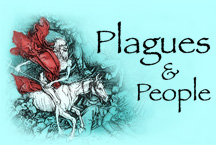HISTORY 135F

Infectious and
Epidemic Disease in History
Department of History
University of California, Irvine
Instructor: Dr. Barbara J. Becker
HISTORY 135F

Infectious and
Epidemic Disease in History
Department of History
University of California, Irvine
Instructor: Dr. Barbara J. Becker
Supplementary readings for Week 10's lectures include news articles on:
Modern medical practitioners possess an array of powerful tools to assist them in preventing and treating infectious disease. That has not made the world immune to epidemic illness. As we explore and develop new and previously undisturbed regions in the world, we inevitably encounter unfamiliar microbes. Some will be harmless, or even helpful to our health, while others may prove harmful, even fatal. Under the right conditions, microbes reproduce with startling rapidity. Variation insures that each new generation of germs will possess a range of physical characteristics. Many will succumb to the challenges of nature and human intervention, but others will survive to reproduce their kind. It only takes one of these tiny survivors to spark a deadly epidemic via the hapless human it encounters.
|
 |
| Go to: |
|